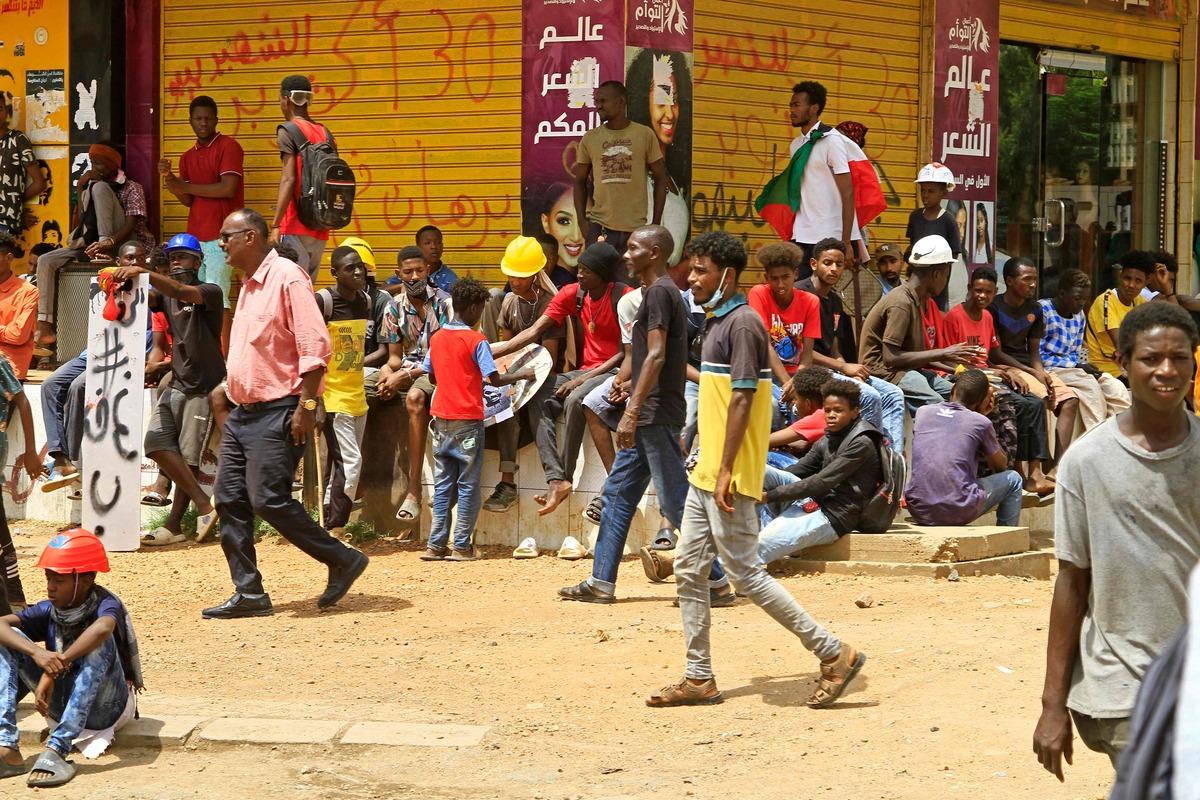Looted safes, absent management and inaccessible accounts due to the lack of internet and electricity: after a month of war, the Sudanese banking system, which was barely in its infancy, has come to a grinding halt.
On the ground, Ibrahim Saeed sat trying to cover his head due to the intense heat of the sun, which exceeded forty degrees, in front of the Bank of Khartoum branch in Madani, where hundreds of families fleeing the ongoing fighting in the Sudanese capital are now residing.
"I came from seven in the morning and now it's midday hoping to get piasters out of my account," Saeed said.
Near him, dozens of men and women crowded under the scorching sun while a number of policemen were trying to organize them in front of a branch of the largest Sudanese bank.
"Sometimes the bank opens its doors after three in the afternoon, and they allow very limited numbers to enter, and if you are not lucky, you come the next day, and I have been going here for three days," Ishraqat al-Reeh said.
"We fled the fighting and we have no other way to get money than from our bank account," she added.
Ahmed Abdel Aziz, 45, is an employee with an account at Omdurman National Bank. The man stood in front of the bank's branch in Madani, although its doors were closed, and said, "We are confused about our situation, because our money is in the banks and we cannot get it."
Because of the confrontations that killed a thousand people and forced two million others to leave their homes, money transfers stopped. Thus, bank employees can only give a limited number of customers a small amount of cash.
The Federation of Sudanese Banks said in a statement issued a few days ago that the heads of banks are seeking to "restore banking services in the state of Khartoum if the conditions conducive to that are available."
A number of bank branches across the capital, Khartoum, were looted after gunmen broke their locks.
Mohamed Abdel Aziz, a banking expert, explained the current situation.
"The banks' servers (computer systems) that control their work are concentrated in the main headquarters in Khartoum," he told AFP, explaining that "employees cannot access and operate them because of the fighting."
He added, "Also, the branches in the states have lost contact with the departments of banks that give them approval for operations."
An employee of the Sudanese French Bank said, on condition of anonymity because he is not authorized to speak, "We cannot carry out money transfers from one account to another, and clearing between banks has completely stopped."
Abdel Aziz explained that Sudanese banks "have completely lost contact with foreign banks since the start of the war, and the current situation leads to a recession in the economy that increases the suffering of citizens."
Despite this pause, Lieutenant General Abdel Fattah al-Burhan, commander of the army and the de facto ruler of Sudan since the 2021 coup, decided to change the governor of the Central Bank, and announced the freezing of all bank accounts of the Rapid Support Forces led by his opponent, Muhammad Hamdan Dagalo.
However, experts question the feasibility of these decisions if the state was unable at the end of April to pay the salaries of employees and retirees.
Twenty years of strict embargo was enough to make the banking system in Sudan almost dilapidated, knowing that the country is still listed on the list of donor countries as one of the "extremely indebted poor countries."
The Sudanese banking system does not allow any bank card payments nor international transfers between individuals.
Sudan has a total of 37 banks, including four state-owned banks that control 14% of banking assets, and seven foreign banks that own 23% of banking assets in the country, according to the International Monetary Fund.
At the end of 2019, the total of these assets was equivalent to $11.8 billion and the International Monetary Fund considered the Sudanese banking system to be “fragile” with many banks with capital below the recognized minimum.
No one knows what is left of these sums. Every day there are new pictures published on the Internet of safes whose contents were stolen and banks looted.
Since the first week of fighting, the army has accused the RSF of "stealing astronomical sums" from an agency affiliated with the central bank in Khartoum.
However, the Federation of Banks does not stop issuing statements in which "customers are reassured that their deposits are safe and secure," and confirms that "their balances and financial information are preserved in their entirety."
While waiting for the banks to return to work, Ibrahim, Ishraqa, Ahmed and the others must buy flour--twice as expensive as before the war--and fuel--twenty times more--with the little money they have left.








Share your opinion
The Sudanese banking system has been destroyed by war and citizens are asking, "Where is our money?"